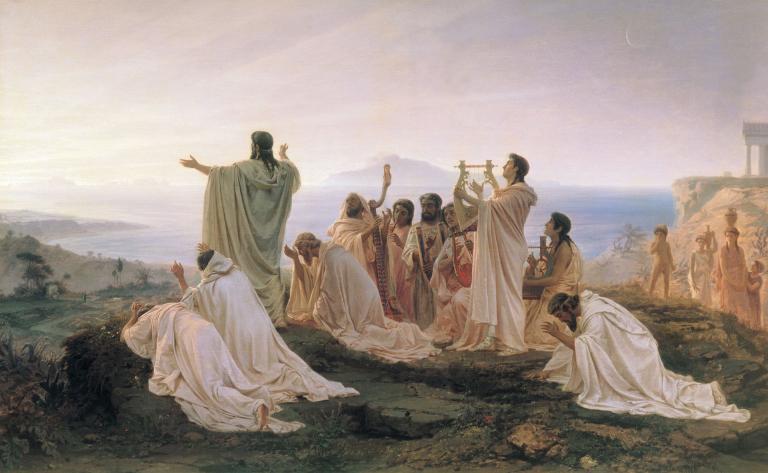
(Wikimedia Commons public domain image)
I first read the Meditations of the Stoic Roman Emperor Marcus Aurelius (AD 121-180) back when I was in high school. (I belonged to some sort of book club through which I bought fairly inexpensive hardback editions of classic works; I still own the copy that I bought and read when I was about fifteen or sixteen.) I’ve had a deep fondness for him ever since, and (although he himself was a pagan and not particularly friendly toward the novel sect of the Christians) much of what he had to say seems appropriate, in my view, for reflection at the beginning of a new year. Here are a few gems:
Ἕωθεν προλέγειν ἑαυτῷ: συντεύξομαι περιέργῳ, ἀχαρίστῳ, ὑβριστῇ, δολερῷ, βασκάνῳ, ἀκοινωνήτῳ: πάντα ταῦτα συμβέβηκεν ἐκείνοις παρὰ τὴν ἄγνοιαν τῶν ἀγαθῶν καὶ κακῶν.
“When you wake up in the morning, tell yourself: The people I deal with today will be meddling, ungrateful, arrogant, dishonest, jealous, and surly. They are like this because they can’t tell good from evil.”
Ὀλίγα πρῆσσε, φησίν, εἰ μέλλεις εὐθυμήσειν
“‘Let your occupations be few,’ says the sage, ‘if you would lead a tranquil life.'”
Ὄρθρου, ὅταν δυσόκνως ἐξεγείρῃ, πρόχειρον ἔστω ὅτι ἐπὶ ἀνθρώπου ἔργον ἐγείρομαι· ἔτι οὖν δυσκολαίνω, εἰ πορεύομαι ἐπὶ τὸ ποιεῖν ὧν ἕνεκεν γέγονα καὶ ὧν χάριν προῆγμαι εἰς τὸν κόσμον; ἢ ἐπὶ τοῦτο κατεσκεύασμαι, ἵνα κατακείμενος ἐν στρωματίοις ἐμαυτὸν θάλπω;
“At dawn, when you have trouble getting out of bed, tell yourself: ‘I have to go to work – as a human being. What do I have to complain of, if I’m going to do what I was born for – the things I was brought into the world to do? Or is this what I was created for? To huddle under the blankets and stay warm?’”
Μηκέθ᾽ ὅλως περὶ τοῦ οἷόν τινα εἶναι τὸν ἀγαθὸν ἄνδρα διαλέγεσθαι, ἀλλὰ εἶναι τοιοῦτον.
“Waste no more time arguing what a good man should be. Be one.”
I’m also fond of this passage from the great UCLA basketball coach John Wooden:
“Make each day your masterpiece.”
I fail at it every day.
But these are appropriate thoughts, all of them, for the early days of the first month of a new year.
Marcus Aurelius is especially good in times of tumult or worry. His is a very calm and calming spirit, encouraging us to focus on what’s most important and and on what’s unchanging rather than on the often distressing and almost always distracting things about us.

Some of you, I think, will find these three short pieces interesting:
“An Overlooked Example of the Book of Mormon’s Surprising Use of Book of Moses Material”
“A New Perspective on Racial Questions about the Book of Abraham”
“The Book of Mormon’s ‘Other Words’ as an Egyptianism”
And this quite different piece, reflecting on a famous recent incident:
“When the Bengals and Bills Bowed Their Heads”

(Wikimedia Commons public domain image)
The funeral of Pope Emeritus Benedict XVI took place today in Vatican City. So it’s perhaps not inappropriate to post a few more links that some of you might find worth a glance. The first of them was written by Rabbi David Rosen, who, back in 1993 when I was leading an intensive Arabic program in Jerusalem and my family and I were actually living in Brigham Young University’s Jerusalem Center for Near Eastern Studies, taught courses on Judaism to the students in the Center. On one memorable occasion, he and his wife and family actually spent a weekend living in the Center and illustrating for the Latter-day Saint students there how a devout Jewish family observes shabbat. It was inspiring, and quite unlike the caricatures of Jewish sabbath-observance with which I (and no doubt others, as well) had grown up. Rabbi Rosen is a very impressive individual.
“The Pope Benedict I knew: A keeper of his faith with a deep respect for Judaism”
I also share here two conflicting accounts of Pope Benedict’s famous remarks at the University of Regensburg, which I myself mentioned a few days ago in my first notice of his death. During radio interviews in both Australia and New Zealand, I had defended him against what I regarded as grossly unfair mischaracterizations of those remarks. In the following two links, Sohrab Ahmari, a Muslim turned atheist who has since converted to Catholicism (partly as a result of Pope Benedict’s thinking), defends Benedict in the New York Times and Mark Silk, a Jewish American academic.
“What Pope Benedict Taught Me About Faith”
“What Pope Benedict got wrong about Islam: Not understanding Islamic theology was only part of it.”
It’s been roughly seventeen years since the Regensburg speech, and I would have to review the text of Pope Benedict’s remarks in order to offer any meaningful response to either of these takes on it. But I remember thinking at the time that the pope may have been impolitic, and maybe too professorial, but that it simply wasn’t true that he had set out to slander Islam, as some were saying. And I suspect that I’m far more disposed to be friendly to Pope Benedict than Mark Silk or his friend Tom Reese appear to be.
I’m not sure that I can square Reese/Silk’s judgment that Pope Benedict refused to listen to other opinions. It’s difficult to reconcile that notion with the audience that he granted in 2005 to the late Italian journalist and vocal atheist Oriana Fallaci. At her death, she bequeathed her personal papers and her collection of historical and other books to the Pontifical Lateran University in Rome. Why? The Associated Press quoted the rector of the university at the time as saying that she had done so out of “veneration” for Pope Benedict XVI. (Which, given the public praise that she bestowed upon him on more than one occasion, is not difficult to credit.)
Nor can I reconcile Reese/Silk’s judgment with the long-term and genuine friendship — including dueling books — between Pope Benedict and the eminent American rabbinic scholar Jacob Neusner, who — as I know from personal experience — was famously irascible. (Happily, his ire was only once aimed directly at me [I still have the email]; usually he was polite to me, even kind, but his temper was explosive and unpredictable and I was always on edge when we were in the same room.) That friendship is briefly mentioned in an interesting statement on the passing of the Pope Emeritus from the editorial board of the Wall Street Journal:
“Pope Benedict XVI, 1927-2022: A papacy dedicated to the interplay between reason and faith.”












